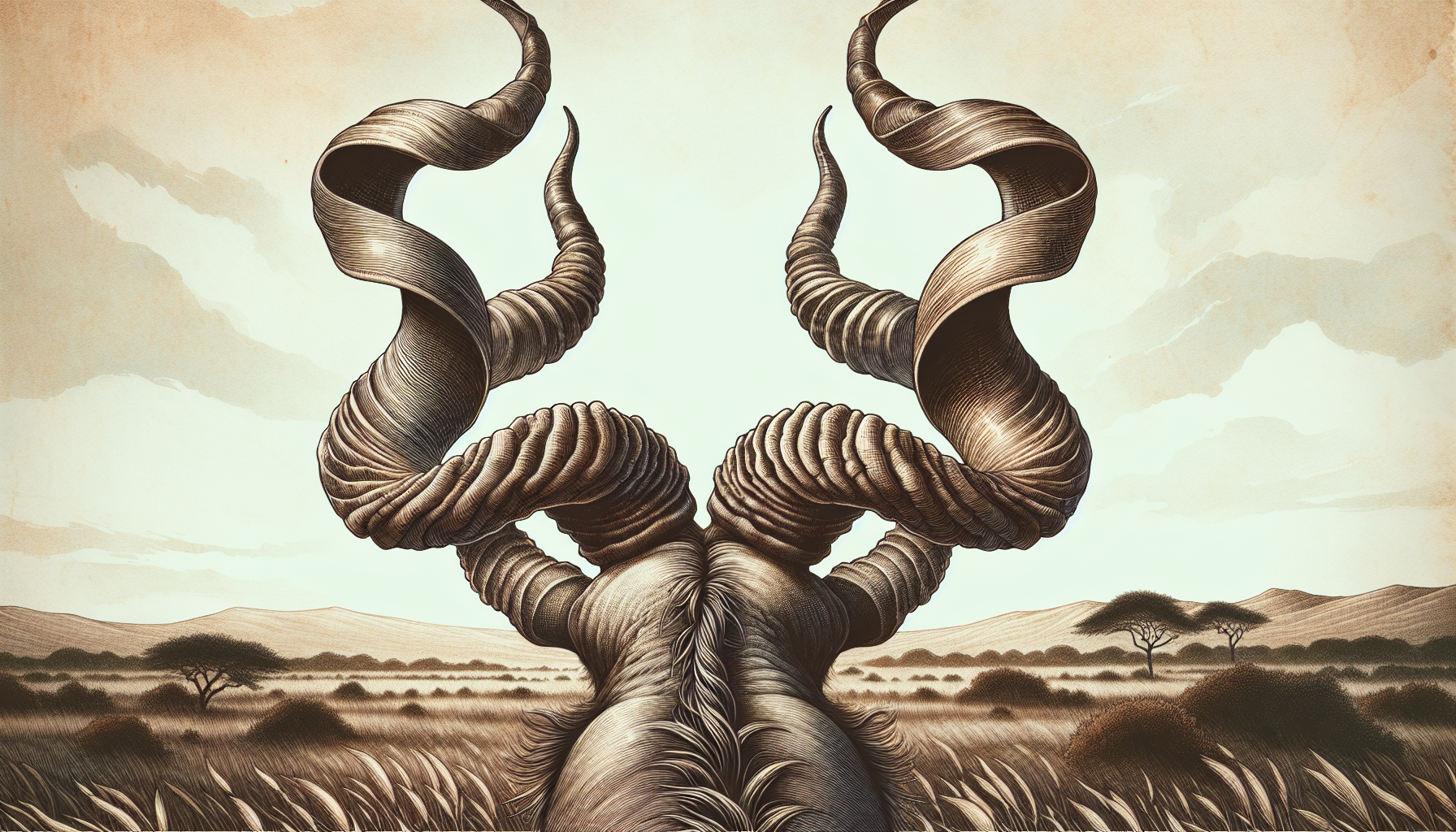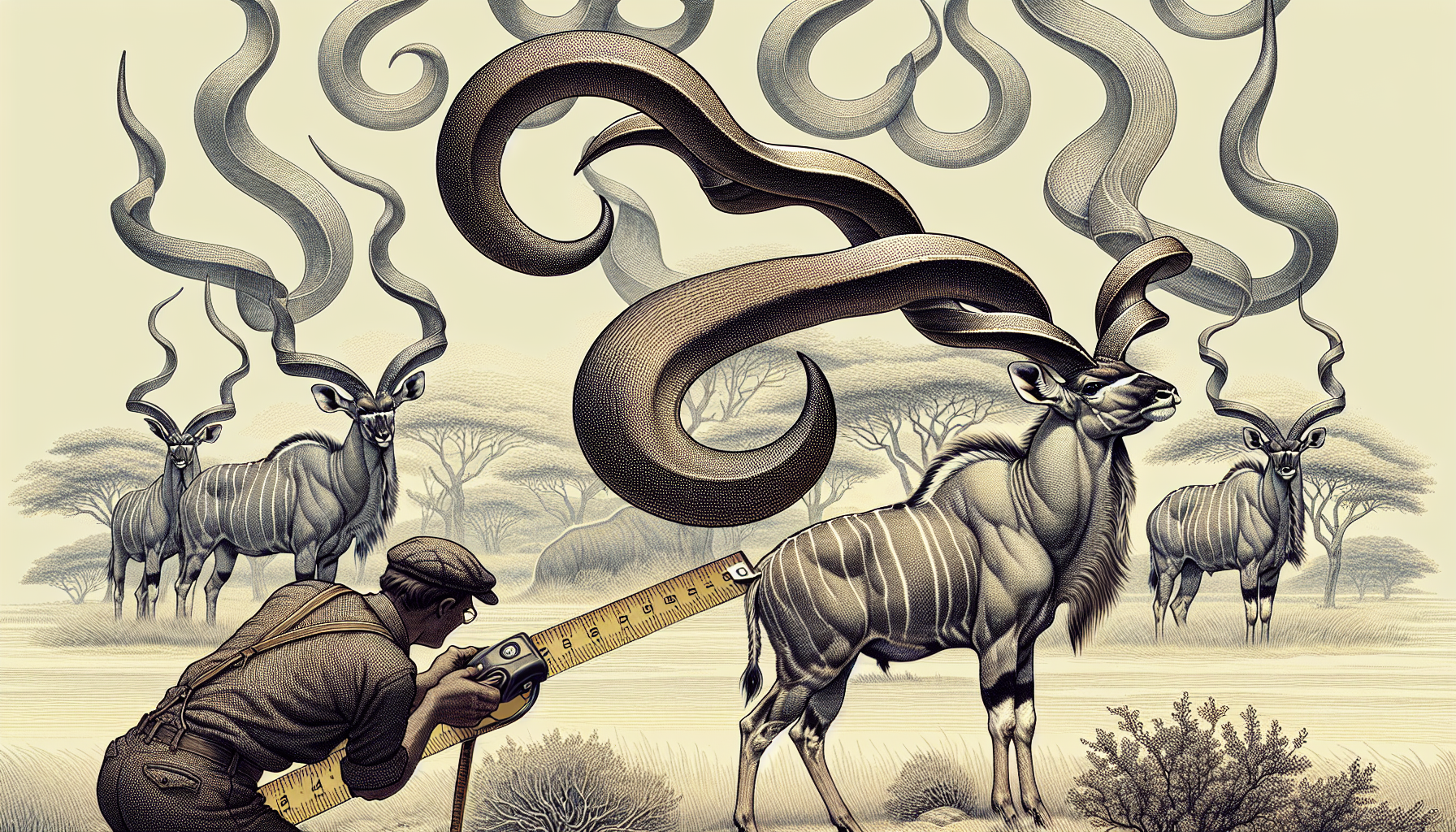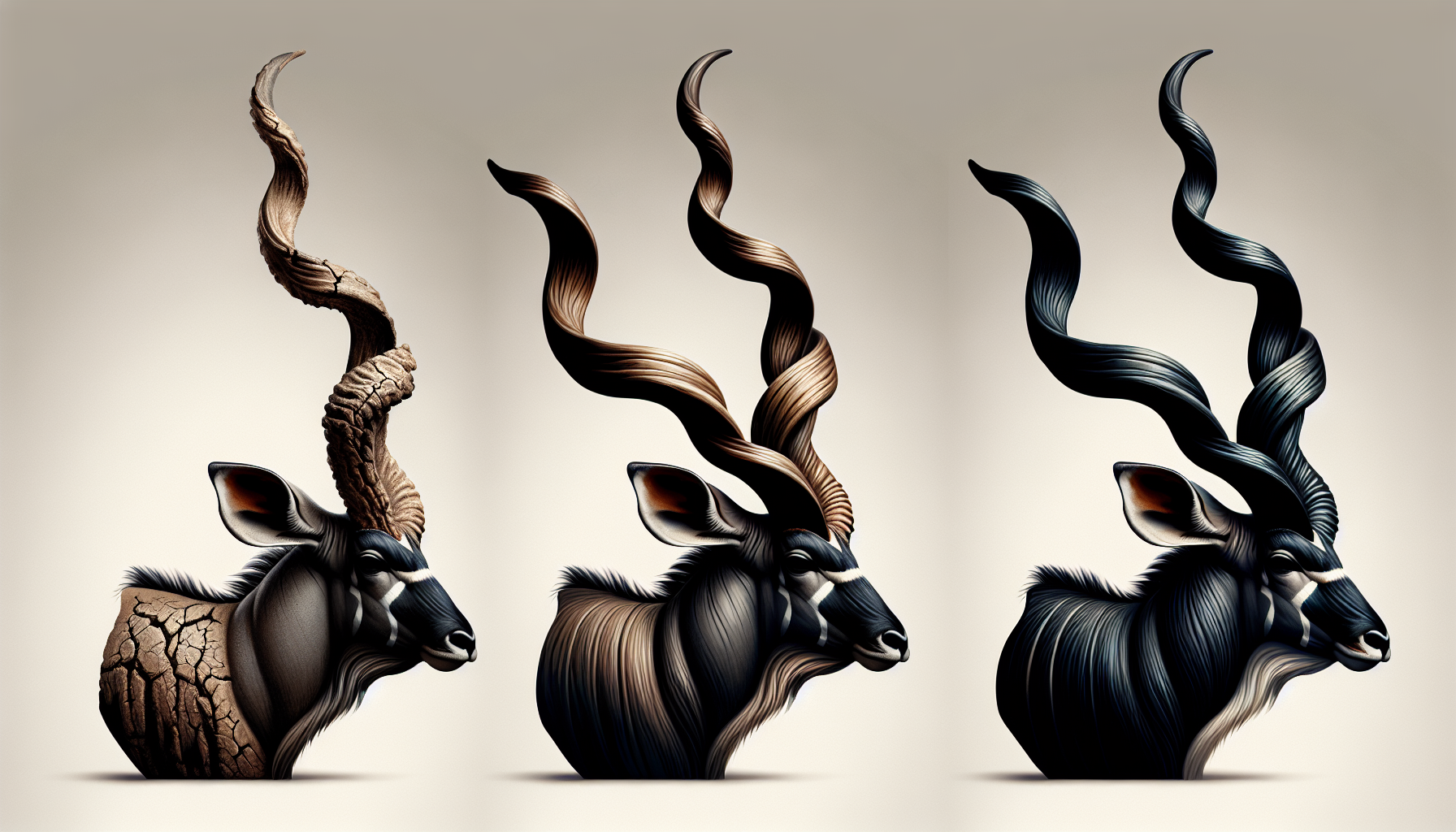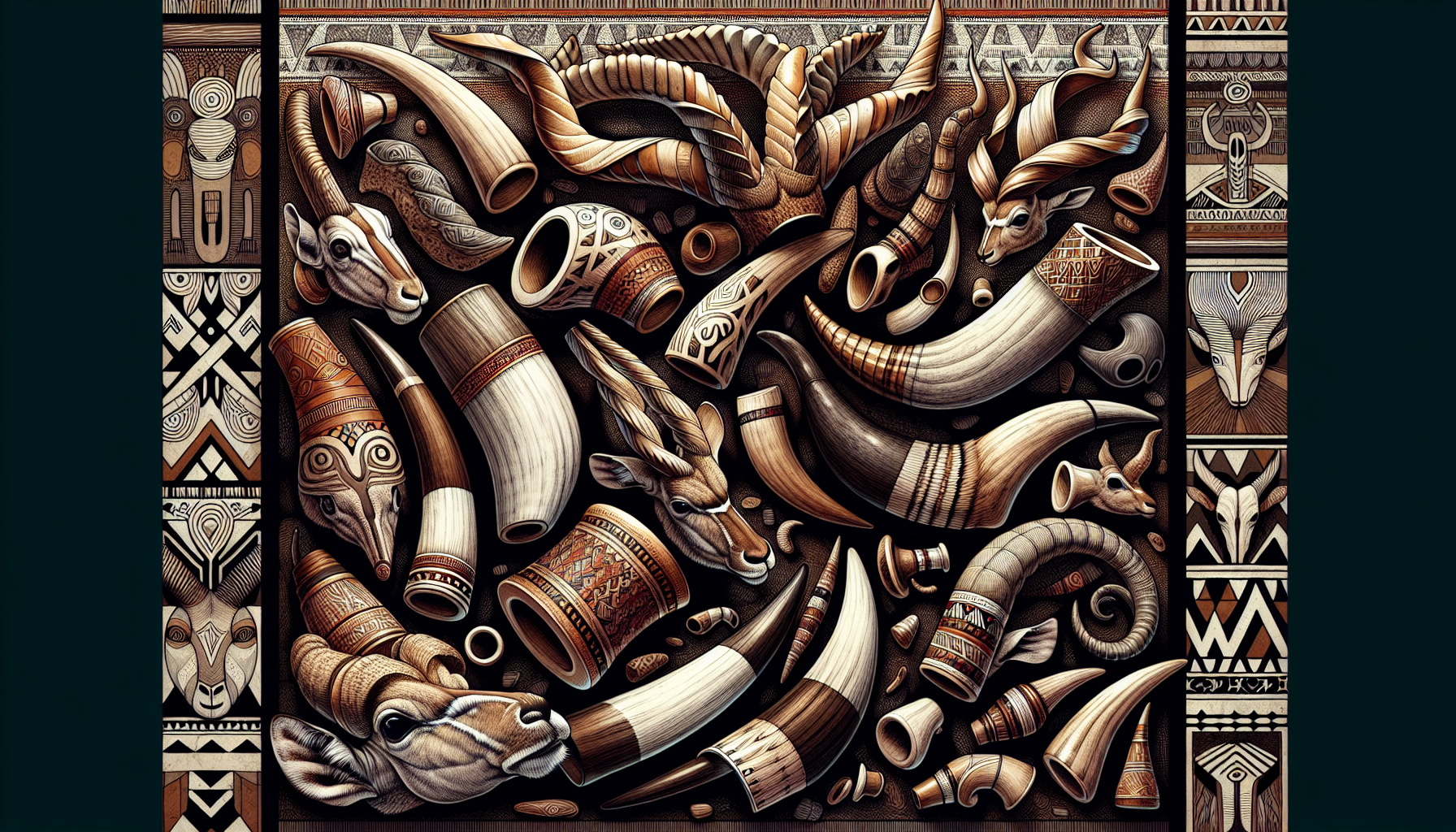Kudu Horns Natural

Browse these categories under "Kudu Horns Natural"
- Our Retail Website With No Minimum Order is:
Authentic Kudu Horns Natural Selection: Discover the Beauty of the Wild
Coveted for their beauty and cultural importance, kudu horns natural artifacts are treasured from the African savannah. As symbols of wilderness that connect us to nature’s narrative, kudu horns are sustainably sourced to minimize ecological impact. This article unpacks their significance and provides a practical guide for ethically acquiring and incorporating these horns into your life and work.
Key Takeaways
Kudu horns are revered for their beauty, cultural significance, and use in various decorative and functional crafts, reflecting a deep respect for wildlife and the natural aesthetic of the horns.
Kudu horns offer a blend of artistic and creative possibilities, from polished decorative pieces enhancing interior design to functional items like musical shofars, emphasizing both the traditional and contemporary use of this natural resource.
The Allure of Natural Kudu Horns

The spiral structure of kudu horns is a marvel of nature, each twist and turn a narrative of survival and grace. These horns are not just a means of defense for the majestic animals; they are a canvas of cultural expression, revered for their beauty and strength. When male kudus clash in dominance battles, their horns interlock in a powerful dance, echoing the very essence of the wild. It is this combination of form and function that has cemented the status of kudu horns as sought-after natural artifacts, finding their place in homes and galleries as symbols of beauty and resilience.
Crafters and collectors alike are drawn to these horns for their natural kudu curves and the cultural significance they carry. The polished kudu horns especially, with their lustrous sheen, elevate any space they adorn. From blowing horns that resonate with ancient calls to kudu skulls that tell tales of the savannah, the allure of these natural sculptures is undeniable. Their journey from the African plains to becoming prized possessions is a testament to their enduring appeal.
The Greater Kudu: A Symbol of African Wilderness
Standing tall with its majestic horns, the greater kudu exemplifies the African wilderness, particularly in eastern and southern Africa. With distinctive stripes and spots adorning its body and a white chevron between its eyes, the greater kudu commands attention. These creatures are essential to the ecosystem, acting as prey for apex predators like lions and hyenas, thereby sustaining nature’s delicate balance.
From Farm to Decor: The Journey of a Kudu Horn
The path of a kudu horn from African farms to becoming a prized decor item is paved with responsibility and reverence for nature. These horns are ethically sourced as by-products of sustainable farming practices and government-regulated culling programs, ensuring that their procurement is both lawful and environmentally conscious. Companies such as Atlantic Coral Enterprises diligently uphold these sustainable practices, acknowledging that the real beauty is rooted not only in the artifact itself but also in its ethical acquisition.
Sizing Up the Splendor: Measuring Kudu Horns

The splendor of kudu horns is not just in their striking appearance but also in the variety of sizes that cater to different preferences and uses. Atlantic Coral Enterprises offers a broad range of sizes, including:
- 15 inches
- 20 inches
- 25 inches
- 30 inches
- 35 inches
- 40 inches
- 45 inches
- 49 inches
This ensures there is a perfect horn for every need. Whether you aim to craft a musical instrument or seek a dramatic display piece, the length and curve of the horn play a significant role in its final aesthetic and function.
Buyers can choose from a range of hand-picked kudu skulls and horn plates, available in sizes from 30 to 49 inches, offering a wide array of options. When measured around their curls, kudu horns can reach an impressive length of up to 57 inches, with Atlantic Coral Enterprises providing options that approach this upper limit. The majesty of the greater kudu is captured in these horns, and their size is a measure of their grandeur, making them a natural selection for those looking to bring a piece of the wild into their lives.
How Kudu Horns Are Measured
Measuring kudu horns is an art in itself, one that requires precision and an understanding of their unique morphology. The spiral ridge of a horn must be followed meticulously with a cloth tape measure to capture its full length. This flexible measuring tool is essential for conforming to the horn’s shape, ensuring that the measurement accounts for every curve and twist.
The tape measure should trace the path of the ridge from the base to the tip, including all the horn’s curls, to ensure an accurate size representation. This attention to detail is crucial as it determines the horn’s suitability for various applications, from blowing horns to statement decorative pieces.
An accurately measured horn reflects the true scale of its splendor, and for those who wish to own a natural kudu horn, understanding this process is the first step in selecting a piece that meets their vision.
Selecting the Right Size for Your Needs
Selecting the right kudu horn for your project or display is a thoughtful process that balances size with visual impact. Larger horns are often sought after for their commanding presence as part of a room’s decor, making a statement that is both bold and elegant. Conversely, smaller horns are perfectly suited for intricate crafting projects where detail and finesse are paramount.
The coil’s width of a horn can influence the perceived size; narrower coils might result in a longer measurement, while wider coils present a more robust visual impact, regardless of their actual length. For artisans, particularly those involved in making shofars or other crafted items, selecting a horn that is free of leaks or cracks is essential to ensure the integrity and quality of the final product. The right kudu horn can elevate a piece from mere decor to a work of art, embodying both the spirit of the animal and the skill of the craftsman.
The Artistry of Polished Kudu Horns

The transformation of raw kudu horns into polished, gleaming masterpieces highlights the expertise and vision of the artisans. In their natural state, kudu horns are a raw and organic tribute to the beauty of the wilderness from which they hail. The journey from the untamed to the refined is marked by a process that enhances the horns’ natural patterns and tones, culminating in a polished finish that reflects light and captures the eye.
Once polished, kudu horns reveal a reflective sheen that accentuates their innate beauty, with a high gloss finish that not only protects but also brings out the depth of their color. This artistry involves careful sanding and the application of specialized waxes, a meticulous process that preserves the natural material’s integrity while highlighting its aesthetic value.
Each polished horn is a unique piece of art, reflecting the artisan’s dedication to honoring the horn’s unique contours and textures.
Before and After: The Polishing Process
The striking transformation of kudu horns through polishing illustrates the refinement potential of the material. The process begins with the application of a mixture of boiled linseed oil, turpentine, and lacquer thinner, which restores the horn’s natural luster and creates a smooth, receptive surface for further treatment. This initial stage is crucial, as it sets the foundation for a high-quality finish that will endure.
Subsequent steps in the polishing process involve a series of sanding and waxing, each contributing to the horn’s final appearance. Artisans carefully apply specialized waxes that impart a durable and attractive lustre, enhancing the horn’s natural beauty.
The finished product is a polished kudu horn that not only serves as a striking decorative element but also bears witness to the artisan’s craft, turning a piece of the wild into a refined artifact of beauty.
Creative Uses for Polished Kudu Horns
Polished kudu horns, with their exotic appeal, serve as a versatile medium for creative expression in art and decor. These horns are transformed into contemporary wall sconces and floor lamps, introducing a distinctive and dramatic lighting element to any interior. The unique twisted form of the horns lends itself to innovative adaptations in lighting design, such as table lamps, chandeliers, and candelabras, which can be accentuated with hand-painted lamp shades and ostrich egg light fittings.
The creative potential of polished kudu horns extends beyond lighting, as they can be used to enhance high-end decor in the form of:
Accents on furniture pieces like leather-covered armchairs with horn armrests
Merging with ceramics, resin, and wood to form captivating decorative objects
Combining with regional artistry to create unique pieces such as porcupine quill and horn sconces from Zimbabwe
These examples demonstrate the ability of kudu horns to complement various textures and add an artistic touch to any space.
Acquiring Your Own Piece of the Wild

Atlantic Coral Enterprises brings the allure of owning a piece of the African wilderness within reach through their offering of natural kudu horns. Whether seeking a single, stunning horn for a personal collection or considering a bulk purchase for larger projects, customers have a variety of options to choose from:
Single kudu horns
Sets of kudu horns
Polished kudu horns
Unpolished kudu horns
With these options, customers can find the perfect kudu horn to suit their needs.
Individual horns from the African Greater Kudu are available for those looking for a specific piece, while bulk lots, offered at discounted rates cater to the needs of bulk buyers.
Making a Legal Purchase: Compliance with Wildlife Services
When acquiring kudu horns, it is paramount to ensure that the purchase complies with the regulations set by wildlife services. Kudu horns must be cleared by the U.S. Fish and Wildlife Service and the U.S. Customs for legal entry into the United States, a process that Atlantic Coral Enterprises meticulously adheres to. This compliance guarantees that each horn has been professionally cleaned and legally cleared for entry, providing peace of mind to customers regarding the legitimacy of their purchase.
The legal clearance of kudu horns not only upholds international wildlife trade laws but also supports conservation efforts by ensuring that the horns are sourced responsibly. This legal framework serves as a safeguard, preserving the greater kudu population and ensuring that the beauty of these natural treasures can be enjoyed without compromising the well-being of the species. By choosing to buy from companies that comply with these regulations, customers contribute to the ethical trade of wildlife products.
Understanding Shipping Costs and Policies
To successfully acquire kudu horns, it is necessary to understand the shipping costs and policies related to their transport. Here are some important points to note:
International shipping is not available for kudu horns or any animal skulls.
Domestic shipping within the United States is provided legally and efficiently for all orders.
This ensures that customers across the country can have their chosen pieces shipped to their doorstep without any legal concerns.
The cost of shipping can vary depending on factors such as the shipping company, the cubic weight, or the quantity of horns ordered. This variability in shipping cost means that customers should be aware of the price implications when planning their purchases. However, the possibility of owning a genuine piece of African heritage outweighs these considerations, making it a worthwhile investment for those enamored with the natural beauty and cultural significance of kudu horns.
Crafting with Kudu: Inspirations and Ideas

Kudu horns, historically significant in Africa, have been used for a variety of purposes including as musical instruments, honey containers, and in significant rituals. Today, these horns continue to inspire creativity and craftsmanship, offering a unique medium for artisans and hobbyists alike. The versatility of kudu horns, whether natural or polished, opens up a world of possibilities for crafting, allowing the essence of the African wilderness to be infused into modern design and art.
The tactile quality and durability of kudu horns make them an excellent material for a multitude of crafting endeavors, from furniture to musical instruments. Their distinctive natural aesthetic adds a layer of authenticity and exotic appeal to any project, inviting crafters to explore the many ways these horns can be transformed into heritage pieces that tell a story of cultural significance and artistic ingenuity.
Turning Horns into Heritage: Making Shofars
The ancient tradition of making shofars from kudu horns connects the present with a rich cultural and religious heritage, particularly in eastern Jewish communities. The shofar, an ancient musical horn, is deeply ingrained within the fabric of religious practice, sounded during the High Holy Days of Rosh Hashanah and Yom Kippur. The greater kudu’s horns, with their majestic spirals, are particularly coveted for creating Yemenite shofars, with a preference for larger horns around 46 inches.
Creating a shofar from a kudu horn requires detailed preparation, including hollowing out the horn by removing the cartilage and customizing a mouthpiece suitable for the blower. This process, while adhering to the requirements of Jewish law, which stipulates that the horns must be free of cracks or leaks, showcases the craftsmanship that goes into making shofars. The result is a spiritual instrument that not only carries the sound of ancient tradition but also the essence of the wilderness from which it originated.
Beyond the Shofar: Diverse Crafting Possibilities
Although shofars are a popular use for kudu horns, their crafting potential extends much further. Polished kudu horns, known for their strength and beauty, are incorporated into the legs of handcrafted furniture pieces, such as unique side tables that marry the wild with the refined. A side table with a base of three real kudu horns supporting a beechwood top with Porcupine Spines inlay exemplifies sophisticated furniture design.
The versatility of kudu horns makes them a favorite among artisans who craft:
blowing horns
kudu horn instruments
lamps
sconces
knife handles
cane handles
inlaid crafts
Their natural aesthetic, coupled with their durability, makes kudu horns a sought-after material for a variety of artisanal and craft projects. Whether it’s the centerpiece of a living room or a hand-held treasure, kudu horns offer a unique blend of natural beauty and functional artistry.
Summary
As we conclude our exploration of the world of natural kudu horns, it becomes clear that these remarkable artifacts offer more than just a connection to the African wilderness—they represent a fusion of beauty, culture, and craftsmanship. From the raw magnificence of the greater kudu to the polished elegance of a horn displayed in a home or office, kudu horns are treasures that carry deep significance and immense aesthetic value.
Whether you are a collector, a craftsman, or someone who appreciates the unique allure of natural artifacts, kudu horns provide an opportunity to own a piece of history and art. Atlantic Coral Enterprises stands as a gateway to acquiring these natural selections, ensuring that each horn is not only a symbol of the wild but also a testament to ethical sourcing and artistry. Let the beauty of the kudu horn inspire your next project or become the centerpiece of your decor, bringing the spirit of Africa into your space.
Frequently Asked Questions
Where do the kudu horns come from?
Kudu horns come from the farming industry and African Government culling programs, ensuring ethical sourcing and compliance with conservation practices. This ensures their origin is sustainable and environmentally conscious.
Are the kudu horns cleaned and cleared for entry into the United States?
Yes, the kudu horns have been professionally cleaned in Africa and cleared for entry into the United States by the U.S. Fish and Wildlife Service and U.S. Customs.
Is international shipping available for kudu horns?
Unfortunately, international shipping is not available for kudu horns from Atlantic Coral Enterprises. They only offer domestic shipping within the United States.
What sizes do the kudu horns come in?
Kudu horns sold by Atlantic Coral Enterprises come in sizes ranging from under 25 inches up to 49 inches, catering to a variety of needs and preferences.
What can kudu horns be used for?
Kudu horns can be used for a variety of purposes, including making shofars, instruments, furniture legs, and decorative crafts. They are versatile and have many potential applications.




